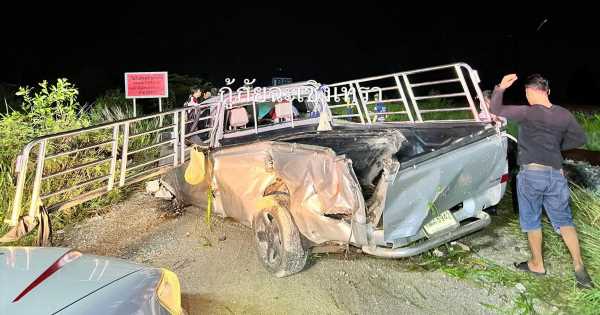Horror train crash kills eight people as truck driver ‘couldn’t stop in time’
A train in Thailand collided with a pickup truck because the driver couldn't stop in time, killing eight people and injuring four.
The freight train struck a pickup truck crossing the tracks in the Muang district of Chachoengsao province in the Southeast Asian country early Friday morning at around 2am, authorities said.
The 54-year-old driver, Wichai Yulek, told authorities he saw the approaching train and heard a warning horn. He slowed, but passengers in the vehicle urged him to keep going.
READ MORE: Beauty queen dies in horror crash after predicting her own funeral months before tragedy
When he realised the truck was headed for a collision, he could not stop in time, the railway agency said.
The deceased include an 18-year-old, two people in their 20s and five people over 55, while the injured victims included four men in their 20s, the railway said.
It comes after a woman passenger died and a newlywed couple were injured when their pickup was hit by an express train at a railway crossing in Chana district, Thailand, in January.
There is a stop sign with a strobe light at the crossing, but no barriers, and the Toyota was in the middle of the crossing upon impact.
Mia Khalifa sparks fury with marriage advice after her two divorces – 'leave these men'
Bangkok Post reported at the time that the impact propelled the pickup off the crossing and down the railway embankment, ending up about 30 metres away with its right side caved in.
At least three people were killed in 2016 when a train collided with a double-decker bus carrying tourists at an unguarded railway crossing west of Bangkok.
Traffic collisions are common in Thailand, with poor safety standards and busy roads believed to be the key factors.
A 2018 report from the World Health Organization (WHO) said Thailand had the second-highest traffic fatality rate in the world.
For the latest stories from across the globe from the Daily Star, sign up for our newsletter by clicking here.
Source: Read Full Article





